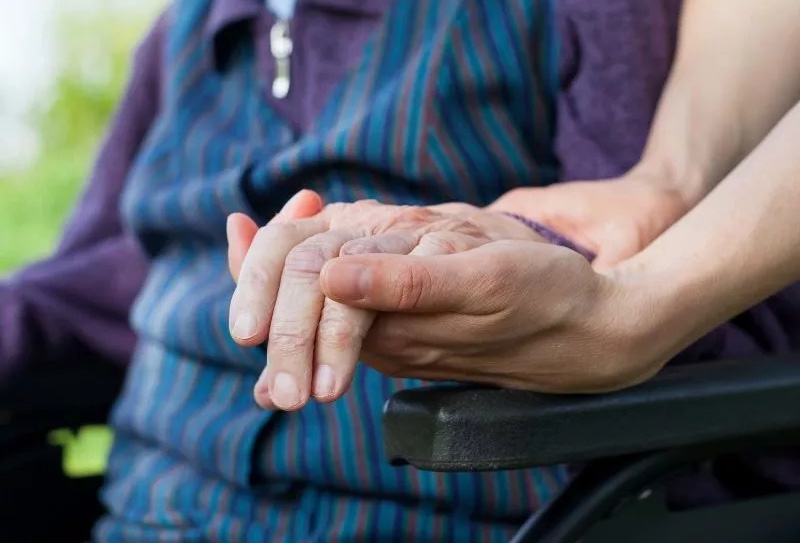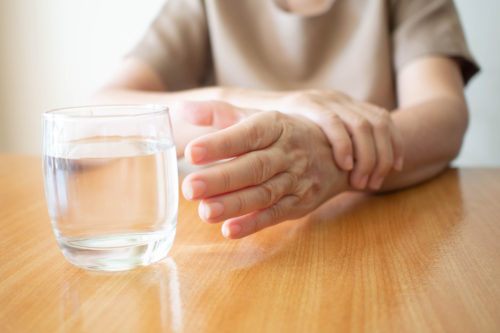Parkinson’s disease is a progressive nervous system disorder that affects movement. Certain nerve cells called neurons in the brain gradually break down or die.
Many of the symptoms are due to a loss of neurons that produce a chemical in the brain called dopamine. When dopamine levels decrease, it causes abnormal brain activity, leading to impaired movement and other symptoms such as thinking difficulties, depression/emotional changes, swallowing problems, chewing and eating problems, sleeping issues, bladder control, and constipation to name a few.
Symptoms start gradually, perhaps just a tremor to just one hand, but the disorder progresses causing stiffness or slowing of movement. Sadly, there is no cure for Parkinson’s Disease.

Criteria Needed to Qualify for Hospice Services
The patient must meet the following criteria.
Rapid disease progression and either a or b below:
- Progression from independent ambulation to wheelchair or bed-bound status
- Progression from normal to barely intelligible or unintelligible speech
- Progression from normal to pureed diet
- Progression from independence in most or all Activities of Daily Living (ADL) to needing major assistance by caretaker in all ADL
AND
Severe nutritional impairment demonstrated by all of the following in the preceding 12 months:
- Oral intake of nutrients and fluids insufficient to sustain life
- Continuing weight loss
- Dehydration or hypovolemia
- Absence of artificial feeding
OR
Life-threatening complications demonstrated by one or more of the following in the preceding 12 months:
- Recurrent aspiration pneumonia (with or without tube feedings)
- Upper urinary tract infections, e.g., Pyelonephritis
- Sepsis
- Recurrent fever after antibiotic therapy
- Stage 3 or Stage 4 pressure ulcer(s)
In the absence of one or more of these findings, rapid decline or comorbidities may also support eligibility for hospice care.
. . . .
 The goal of hospice services is to provide a quality, peaceful death while allowing the person with Parkinson’s disease to remain in a familiar environment such as their home, assisted living or long-term care facility.
The goal of hospice services is to provide a quality, peaceful death while allowing the person with Parkinson’s disease to remain in a familiar environment such as their home, assisted living or long-term care facility.
Hospice provides ongoing education related to caring for a loved one at home. It can be overwhelming to care for a loved one that is no longer able to do the things that they normally were able to do in the earlier stages of the disease. Unfortunately, in the later stages of PD, patients eventually lose the ability to care for themselves and require assistance with most activities of daily living. Some families struggle seeing their loved ones deteriorate and often feel helpless as PD symptoms are irreversible. Unfortunately, there is no cure for PD but certain medications have been approved to help with symptoms and slow down the progression of the disease.
Some of these earlier symptoms can be managed with medications and therapy. Physical therapy can help in the earlier stages of the disease and can help people with Parkinson’s maintain some independence. As PD progress we see symptoms such as shuffled gait which can cause risk for falls and injuries, and uncontrolled tremors that prevent people with PD from doing simple things such as feeding themselves and other independent activities. People with Parkinson’s are aware of the disease and its progression. People that I have cared for with PD have told me that they feel trapped in their bodies. They want to do things and struggle because their minds are intact, but their bodies have failed them. They have good stories to tell, yet even their speech becomes impaired.
Symptoms seen in the later stages of the disease can include, immobility, difficulty swallowing causing weight loss and malnutrition, unintelligible speech, and even difficulty breathing. The Hospice care team can help with the care and the Registered nurse educates the family on how to provide that care and help manage those symptoms. Hospice nurses are experts at providing comfort care at end of life and work together with the patients and their families to develop a plan of care specific to each patient’s needs whether it is pain management, fall prevention, aspiration precautions, or ongoing education. SW and Chaplains develop a plan of care also specific to the patient and family’s needs whether to make final arrangements or provide support to help with the acceptance of the final stages of the disease. Hospice care can provide valuable bereavement services for caregivers and families while on service or after a loved one passes away.


